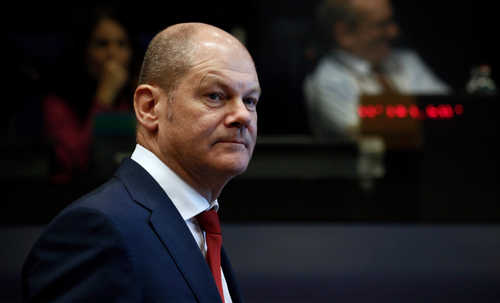Some U.S. lawmakers agree, with the head of the U.S. House of Representative Financial Services Committee Maxine Waters (D-CA) previously calling for Facebook to delay Libra’s launch until regulatory approval was received. The House Committee is still pressuring Facebook CEO Mark Zuckerberg to testify before Congress on the matter before January 2020.
Germany’s federal finance minister has come out in support of digitizing the euro, but is against private currency projects like Facebook’s Libra.
Speaking with local business news source Wirtschafts Woche, Minister Olaf Scholz said he remains “very, very critical” of Libra. However, an e-euro would be good for Europe’s financial system, particularly in the wake of economic globalization.
“Such a payment system would be good for the European financial center and its integration into the world financial system”, Scholz said. “We should not leave the field to China, Russia, the U.S. or any private providers.”
Echoing other European leaders, such as French finance minister Bruno Le Maire who said France would block Libra, Scholz argued that the power of currency issuance should reside in the hands of the state, saying:
“A core element of state sovereignty is the publication of a currency, we will not leave it to private companies.”

Members of the Libra Association, slated to sign a formal charter sometime this quarter, have been feeling the effects of such criticism. Financial service firm PayPal announced its decision to leave the association last week, citing the need to work on its own mission.
G-20 Urges Countries to Adopt Tough FATF Rules on Cryptocurrencies
Finance ministers and central bankers from the G-20 are pushing for wider adoption of standards that compel cryptocurrency exchanges to disclose user information.
Following a summit in the Saudi-Arabian capital Riyadh over the weekend, representatives from G-20 financial institutions pressed countries that have not done so already to align themselves with global cryptocurrency standards from the intergovernmental organization, the Financial Action Task Force (FATF).
«We urge countries to implement the recently adopted Financial Action Task Force (FATF) standards on virtual assets and related providers,» reads a joint-communique published after the summit.
Finalized in the summer, FATF’s controversial «travel rule» requires virtual asset service providers (VASPs), including wallet providers and exchanges, to share user information with one another each and every time funds are transferred.
The recommendation is designed to prevent terrorists and money launderers using cryptocurrencies to bypass existing controls and sanctions. In June last year, the G-20 reaffirmed it would align with the new rules.
FATF recommendations are non-binding and give authorities some room to interpret new standards into local law. But countries that seriously diverge or do not adopt recommendations face being blacklisted, potentially cutting them off from crucial investment and global trade.
Many of FATF’s 36 member-states, which include G-20 economies, have already adopted the travel rule. Both South Korea and Singapore have passed legislation that compels VASPs to comply with new anti-money laundering frameworks.
The EU’s fifth anti-money laundering directive (5AMLD), which requires exchanges to register with local regulators and demonstrate compliance, came into force at the beginning of 2020.
Recognizing the growing need for an efficient global remittance solution, G-20 ministers at the weekend reiterated a statement from October calling on countries to do more research and risk-assessment into «global stablecoins» before they enter mainstream circulation.
The communique also requested local authorities assist the Financial Stability Board (FSB), which monitors the vulnerability of the global financial system, in drawing up new recommendations for the global regulation of cryptocurrencies.

